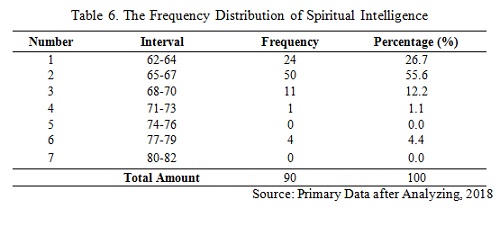
The Effect of Intellectual, Emotional, and Spiritual Intelligence on the Economic Learning Achievement of SMA Negeri 1 Soppeng
Abstract
Keywords
Full Text:
PDFReferences
Cherniss, C., Roche, C., & Barbarasch, B. (2016). Emotional Intelligence. In Encyclopedia of Mental Health: Second Edition. https://doi.org/10.1016/B978-0-12-397045-9.00207-X
Chipumuro, J. (2015). Emotional Intelligence and Perfomance Effectiveness: a Gender Comparison At Stenden South Africa. Proceedings of the 9Th International Management Conference: Management and Innovation for Competitive Advantage.
Gerhart, B., & Fang, M. (2015). Pay, Intrinsic Motivation, Extrinsic Motivation, Performance, and Creativity in the Workplace: Revisiting Long-Held Beliefs. Annual Review of Organizational Psychology and Organizational Behavior. https://doi.org/10.1146/annurev-orgpsych-032414-111418
Goleman. (2002). Emotional Intelligence. PT. Gramedia Pustaka Utama.
Habibah, S. (2001). Meningkatkan Kinerja Melalui Mekanisme 360 Derajat. Telaah Bisnis, 2(1), 27–37.
Marshall, & Zohar, D. (2001). SQ: Memanfaatkan Kecerdasan Spiritual dalam Berfikir Integralistik dan Holistik Untuk Memaknai Kehidupan. Mizan.
Mudali. (2002). Quate: How High Is Yours Spiritual Intelligence. http://www.eng.usf.edu/gopalaks/articles/spiritual.html
Mudiono, A., Gipayana, M., & Madyono, S. (2016). Developing of Integrated Thematic Learning Model through Scientific Approaching with Discovery Learning Technique in Elementary School. International Academic Journal of Social Sciences.
Pangestu, A. A. B. (2019). Pengaruh Kecerdasan Intelektual, Kecerdasan Emosional, Kecerdasan Spiritual dan Kecerdasan Sosial terhadap sikap etis Mahasiswa Akuntasi. Jurnal Akuntansi Dan Sistem Teknologi Informasi, 14(2).
Riasning, N. P., Kade, L., Made, D. I., & Putra, W. (2017). Pengaruh kecerdasan intelektual, kecerdasan emosional dan kecerdasan spiritual terhadap sikap etis mahasiswa akuntansi di kota denpasar. Jurnal KRISNA: Kumpulan Riset Akuntansi.
Suduc, A.-M., Bizoi, M., & Gorghiu, G. (2015). Inquiry Based Science Learning in Primary Education. Procedia - Social and Behavioral Sciences. https://doi.org/10.1016/j.sbspro.2015.09.044
Sugiyono, P. D. (2016). metode penelitian kuantitatif, kualitatif,dan R&D. In Alfabeta, cv.
Suryaningsih, D., & Wahyudin, A. (2019). Pengaruh Tiga Dimensi Kecerdasan dan Locus of Control Terhadap Perilaku. Economic Education Analysis Journal, 8(3), 967–982.
Wiramiharja, S. (2003). Keeratan Hubungan Antara Kecerdasan, Kemauan dan Prestasi Kerja. Jurnal Psikologi, 11(1).
Zulyadaini. (2017). Effects of Creative Problem Solving Learning Model on Mathematical Problem Solving Skills of Senior High School Students. IOSR Journal of Research & Method in Education. https://doi.org/10.9790/7388-0703033337
DOI: http://dx.doi.org/10.31258/jes.4.3.p.560-574
Refbacks
- There are currently no refbacks.
Copyright (c) 2020 Muh. Yahya, A. Mulyadi Radjab, Satriyani Satriyani

This work is licensed under a Creative Commons Attribution 4.0 International License.
Publisher: FKIP Universitas Riau












